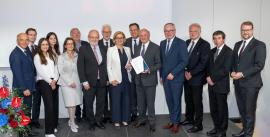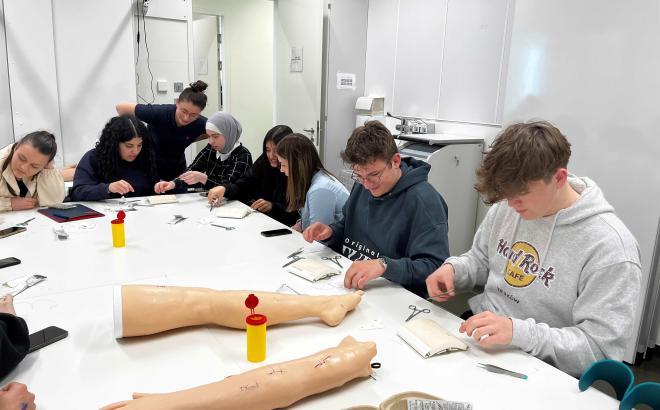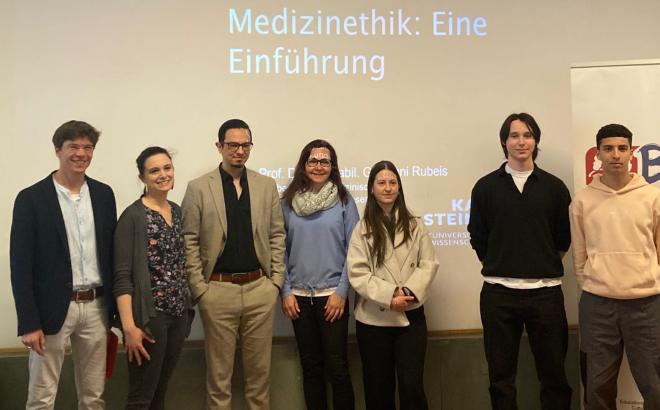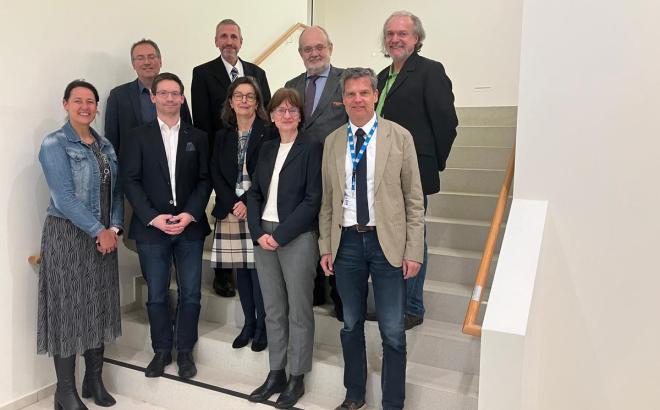KL Krems celebrates 10th anniversary of founding
In the presence of Governor Johanna Mikl-Leitner, the Karl Landsteiner University of Health Sciences in Krems (KL Krems) celebrated its 10th founding anniversary on Friday, May 12, 2023, together with around 200 guests from education, science, healthcare, politics and business. During the event, former Governor Erwin Pröll was awarded the dignity of Honorary Senator of KL Krems for his services to the foundation and development of the university.

The ceremony was opened by Rudolf Mallinger, founding rector of Karl Landsteiner University of Health Sciences. The former Vice Rector for Education at the Medical University of Vienna, who has been significantly involved in the development of the university from the beginning of the project, gave a review of the milestones: "KL Krems has developed incredibly over the last ten years," said the Rector. "We started with 9 employees and 27 students in medical school. Today, we stand at more than 200 employees and 700 students in two fields of study: Psychology and Medicine." The research figures are remarkable as well, he said: While in 2017 there were 12 approved projects, most of which were competitively acquired, by 2023 there would be 124 projects with a total volume of third-party funding of 18.21 million euros.
Outlook for the future: PhD program and new study programsRector Mallinger then gave an outlook on the further development of KL Krems: In addition to planned new study and continuing education programs and the PhD program in Mental Health & Neuroscience, which was recently submitted for accreditation, the Rector emphasized above all the central building blocks for quality assurance in research and teaching, as well as the importance of diversity for the future of a modern university. In a video message, Martin Polaschek, Federal Minister of Education, Science and Research congratulated on the anniversary and emphasized that "Karl Landsteiner University has enriched the private university sector for 10 years and it is impossible to imagine the Austrian university landscape without it."
This was followed by interviews with the Chairman of the University Council Wolfgang Schütz, Prorector Sabine Siegl and Vice Rector for Education Manfred Wieser about the key tasks in the development of internationally renowned, competitive research at KL, in the economic consolidation of a young university and in the quality assurance of education on the basis of continuous optimization and reform of the curricula. Psychology student Sophie Kellerberger and medicine alumna Valerie Klamminger gave an insight into their study experiences and successful entry into the professional world.
In her ceremonial address following the interviews, Governor Johanna Mikl-Leitner highlighted the positive development of Karl Landsteiner University: "Karl Landsteiner University has undergone impressive development since its founding and today already provides us with highly trained medical personnel. We need these excellently trained physicians and psychologists more than ever before. The past few years have shown that the challenges in the health care sector are not becoming less, but more. Thus, the importance of the Karl Landsteiner University of Health Sciences for the province of Lower Austria cannot be overestimated!"
Stephan Pernkopf, Deputy Governor of Lower Austria and responsible for science and research in the provincial government, also attended the ceremony. He congratulated: "Lower Austria has relied on science for many years and decades and is today a nationally and internationally recognized research location. From practical training to cutting-edge research, the health sciences in particular benefit all Lower Austrians in their translation and application. In this way, science, and Karl Landsteiner University in particular, points a path to the future of our country."Neurologist Dieter Haubenberger spoke about "Neuro-Therapies in the 21st Century - Opportunities and Challenges" as part of his keynote lecture. The head of translational and clinical research at the US biopharmaceutical company Neurocrine Biosciences spoke, among other things, about the great importance of interdisciplinary cooperation in medical research.
Former Governor Erwin Pröll appointed honorary senatorThe highlight of the ceremony was the honor given to former Governor Erwin Pröll, who was awarded the title of Honorary Senator of KL Krems by Rector Mallinger in the presence of Governor Mikl-Leitner for his services to the founding and development of the university. The honorary senator expressed his gratitude for the award and gave the university the message for its future path: "The principle of the university must in any case remain: Class instead of mass - and at the highest level of quality."
10 years of Karl Landsteiner University - a success storyKarl Landsteiner University was the first university in Austria to establish a two-part, Bologna-compliant medical degree program, thus setting a milestone in the domestic educational landscape. With a modern study structure, KL guarantees the training of medical experts at the highest professional and scientific level. The central cornerstones include a modular curriculum, a strong focus on small-group teaching, and the development of cross-cutting areas in which key competencies such as medical economic and technical knowledge, professional development, and scientific work are taught. With the psychology program established in 2016, KL launched another practice-oriented full-time program - with the aim of explicitly promoting interprofessionalism in both central fields of healthcare.
Interdisciplinary integration in researchIn research, Karl Landsteiner University has focused from the very beginning on the interdisciplinary integration of trend-setting disciplines in the fields of technology and medicine as well as life sciences and humanities. In addition, the university focuses on scientific research in primary and secondary care. Here, KL has been able to contribute valuable research results in recent years with its competence centers in the fields of general and family medicine, gerontology and aging research, and nursing science with a focus on Person-Centered Care Research.One university with three university hospitalsSince 2017, KL has had its own university building at the Krems campus, which provides space for teaching, research and administration. With its three university hospitals in Krems, St. Pölten and Tulln, the university has ensured quality-assured clinical research and education since its foundation. Two further locations in Wiener Neustadt (MedAustron) and Eggenburg (Psychosomatic Center Waldviertel) contribute significantly to interdisciplinary research and practice-oriented education. Numerous scientific and economic partners in Austria and abroad offer researchers, students and alumni the opportunity to deepen their practical training and pursue a research career.
For health with a future: PhD program and new study programsKarl Landsteiner University is moving into the future with important projects: in 2023, the first PhD program in Mental Health and Neuroscience will be submitted for accreditation to the Austrian Agency for Quality Assurance and Accreditation (AQ Austria). With this, the university takes another key step in the development of academic career models at KL. At the end of 2023, new building complexes will be added to the Krems campus - KL will also take up another building and create more space for teaching and research. In addition, the range of courses offered at the university is to be expanded in the coming years - always with a view to the future requirements in the healthcare sector and the increasing demand for personnel on the labor market
Benefit for Lower Austria: KL as a Business Partner and Attractive EmployerThanks to its patient-oriented teaching and research and the high quality of its graduates, Karl Landsteiner University not only contributes to the stability of healthcare in Lower Austria. As a university enterprise, KL also plays an increasingly important role in the growth of the local economy. With more than 200 employees, KL has established itself as an attractive regional employer. Together, the KL team contributes to making research and education possible in such a way that Karl Landsteiner University is a place of inspiration and motivation.




